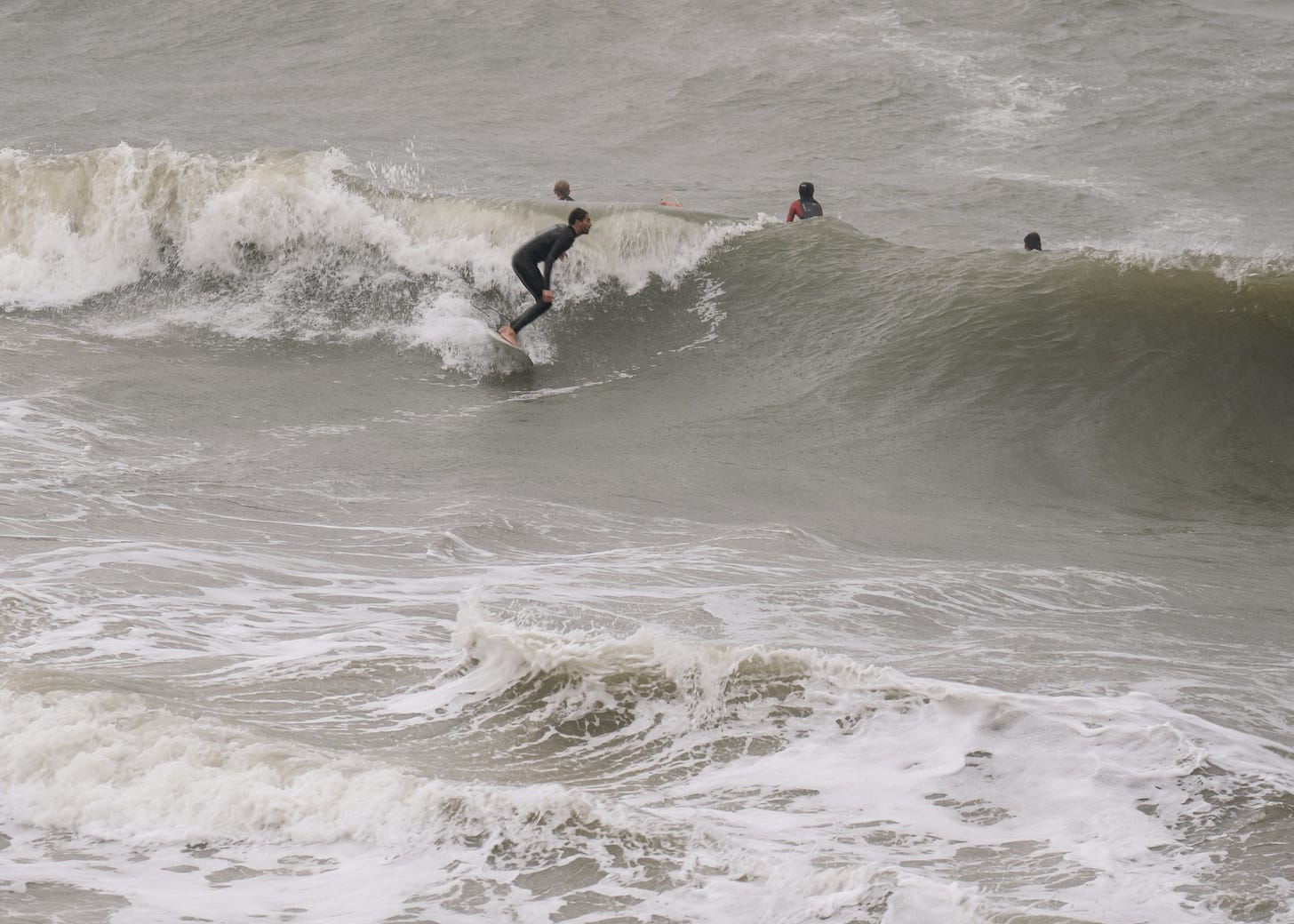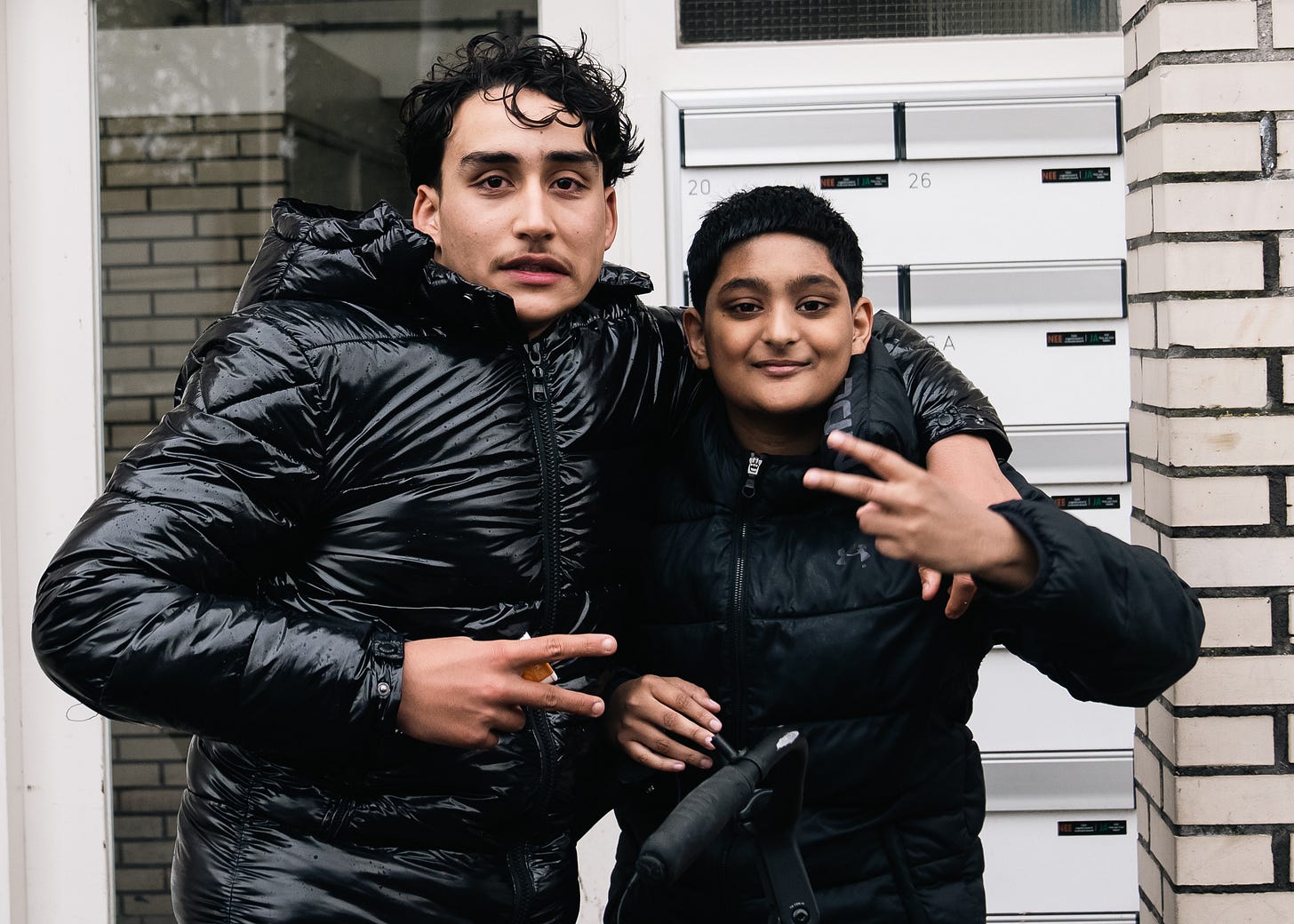The boys kick each other and a man checks the post, The Hague, 17th November 2022
I was born in The Hague but had never been back as an adult, we left when I was around four years old for the UK, my birth certificate was handwritten in black ink in Rotterdam. By Michael John Cooper, Her Britannic Majesty’s Consul. My parents would talk about The Netherlands fondly, Dad would still visit, missed it.
Halfway through high school, Dad had had enough, we’d been spat at, had fist fights in our corner shop, the National Front sprayed graffiti (so did supporters of the IRA), the BNP was rising, he asked us if we wanted to move back. We’d made friends, were doing alright in school, didn’t want to move. He brought brochures from the British School of The Netherlands, it felt exciting but we said no to Dad’s plan of moving back.
I used to tell people at school I was Dutch. I wasn’t. After Brexit, I enquired about Dutch citizenship, the consulate staff in Manchester told me I didn’t qualify, that I hadn’t spent any time in the country, not paid any taxes, didn’t know the language. So I decided to go myself, for my birthday, on turning forty-four, take my camera and visit the places my parents remembered.
Getting to The Hague was easy, after the Eurostar, regular trains from Amsterdam took commuters who couldn’t afford to live in the capital. On the train my mum called to say happy birthday, she described our old street, the open market nearby, how she used to get the tram, drop us off at school and go to the sea. I knew the hospital I was born in from the birth certificate—Westeinde. She said someone had fixed a mini car to a wall and people used to take photos with it. I wrote these things down, wanting to find them all.
On getting to Den Haag Centraal station I saw two police officers, I asked them for directions to the street my mum had told me we lived on, we couldn’t find it on Google, they told me about a tourist shop inside the station. In there I met Karl, he told me the street sounded like one he lived on. It’s a low income area, the Dutch say it’s a ghetto but I appreciated the cheap rent, he told me. He showed me the street on Google Maps. I covered my camera bag with a rain cover and headed out. Through the city centre, past City Hall, through China Town and then onto the street I’d been directed to.
Every so often I’d think about The Hague, it seemed glamorous from afar—a world class university, the international courts, a beach but the bit we’re from is poor with mosques and a red light district. Young brown boys who looked like me skidded on bikes on the wet street by snapping at the brakes, throwing the back wheel forward at each other laughing loudly. I used to do that. They were from Morocco, Iran and Suriname, they asked me if I was the police, no I’m not, they told me not to take their picture because the police were after them. I slapped one on the shoulder feeling like he’s my little brother and laughed—the police aren’t after you, you idiot, I said. He laughed back and posed.
The boys pose on Hobbemastraat, The Hague, 17th November 2022
After turning the corner onto Hobbemastraat I didn’t see a single white person until I hit a main road where they drove past in cars slicing the wet road, along the way women who looked like my mum wearing traditional dress walked the cold streets clutching shopping bags of halal meat, men with long beards walked between the flats and the shops to the mosque. When the Pakistanis moved into Duke Bar in Burnley, the white people moved out. A ghetto? Maybe. Why? For protection? Maybe. I did feel at home but know if we live separate lives we’ll not understand each other. I took pictures of two Pakistani men wheeling a fridge into a shop and they asked why I was taking their picture, suspicious of me. I told them the story. We carried on.
It rained. Lots. And the wind nearly blew my cap off. I went to hospital we were born in, the receptionist told me how it had changed but the old buildings were still there, from the seventies. I bought two blue bibs and a pink one, on the front it read “Geboren in het HMC” (Born in the HMC), the hospital used to simply be called Westeinde Hospital, the receptionist told me. Three of us were born here. The rain lashed down and I got the tram to the sea.
There was the wide powerful sea and along the pier ruining it was bad music, fatty food, slot machines and small dark shops with fancy clothes from designers you’d never heard of being bought by old Chinese people on mobility scooters. I got on the ferris wheel that took you high above it all. An elderly woman too scared to get on because of the wind watched friends get on as she stood sheltering half in a doorway waving them off. Up there left and right I saw young people surfing in the cold North sea, good for them I thought, they looked alive and free and the sand stretched for over six miles as far as the eye could see, really. It was my birthday and I was riding a ferris wheel alone in the wind and the rain, I tried to video call my mum but she didn’t answer.
There’s a photo of my dad with me and my sister in that sea. He was a good looking man from a village in Pakistan who’d made it to here and grew his hair long, wore flares and smoked. My mum tried the western styles too but mainly dressed like the Punjabi she is and still does today in the UK. We went from Kharian, a small town to The Hague, bigger but still lived like we used to, lots of us in a house. Two to a bed. And Burnley was the same. Mum always says ‘Saada Burnlah’ - our Burnley. What makes a place yours? Home?
Me, my dad and my sister in the sea
Waiting for the train back to Amsterdam I knew I’d come back here. I’m trying to convince my mum, I know dad will come, but she’s had a heart attack, is feeling weak. The mini on the wall was taken down after one of the hubcaps fell off because of the bad weather, it’s back up now but I missed it because of the bad weather. Next time.
Dad called that night, worried I wasn’t working but when we started talking about The Hague, he reminisced. When I told him about the boys there, he said that was all that was ever going to happen to that area, that it was always going to be for people like us. I felt we’d always lived in the same places, in Pakistan, The Netherlands and the UK.
Back in the capital and nearing midnight, I looked at the pictures I took of the boys from the block, they were me and my friends when we were young. I knew it was important to take pictures of them, describe their lives, Chris Killip said it was about showing the people who had history done to them. I feel that too. And a little like I’m seeing myself too. Dawoud Bey took a photo of a barber in 1976 in Harlem, and recently the man’s daughter contacted him since she didn’t have any pictures of her dad at work and came across his image. The boys will grow up. Might move. Who will they be? Why did I feel a need to talk to them, take their pictures? Will they see themselves years later? I don’t have all of that answer, yet.
Back in the UK, I gave my family the bibs and clog key rings, Dad put one on the front door key and we talked over dinner, my middle brother put his bib around him and pretended to cry like a baby and got chicken curry on it.









Really interesting read Adnan, thanks for sharing.